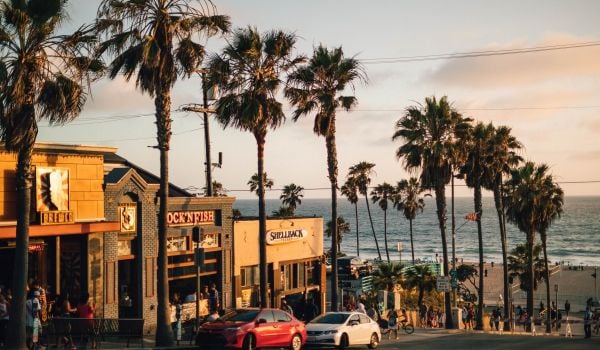Los Angeles’ gang violence problems can seem intractable. Ideas to solve the woes are often limited, ill-conceived, or constitutionally questionable.
And then there’s the work of fabled Jesuit priest, Father Gregory Boyle.
Boyle – or, “G,” “Father G,” or “G-Dog” to his friends – is the founder and executive director of Homeboy Industries. Homeboy is a Los Angeles landmark, a one-of-a-kind – but yet, so tantalizingly replicable – “jobs not jail” program created to help gang bangers leave the life and begin anew.
“I founded Homeboy Industries in 1988,” Boyle says in a video posted at the Homeboy website, “to address the root causes of gang violence: Poverty, lack of access to opportunities and education, but most importantly, a lethal absence of hope.” He continues: “We address that lethal absence of hope here at Homeboy by building community.”
That community means bringing together young boys and men – and some but fewer girls and women — from hundreds of the city’s often-rival gangs, and offering them counseling, mentorship, tattoo removal service, daily proof they can get along with their perceived enemies, and a paying gig.
Homeboy Industries’ in-house businesses include Homeboy Bakery, Homegirl Café, Homeboy Silkscreen & Embroidery, and Homeboy Press. The latter released last month The Homeboy Review, a literary journal. The Silkscreening business does private label work as well as the signature “Jobs Not Jails” hats and shirts available for purchase both online and from the Homeboy Merchandise store located in the lobby of Homeboy Industries’ near-downtown Los Angeles headquarters.
Also at that headquarters: The Bakery is great, and the Café, even better. (Next time you’re in L.A., go there and order anything off the food menu. To drink, get the Angela’s Potion mint spinach lemonade concoction. Trust us.)
Both the eateries are said to be profitable. But the social services Homeboy Industries provides are, by definition, not moneymakers. In the long run, of course, they would appear to clearly be municipal money savers.But even in flush financial times, there’s rarely a mass political will and public constituency for Homeboy’s work.
So currently, even by its own fragile standards, Homeboy is facing an existential crisis. In May, Boyle announced the lay-offs of 300 or so of the organization’s 400 or so staffers. He said that Homeboy had a $5 million budget deficit.
In addition to citywide shock, and hand-wringing, in keeping with Boyle’s mission, there’s likewise been an outpouring of pro-Homeboy hope. Homeboy set up a “Virtual Car Wash” to help raise funds. If you are reading this and can afford $10, then click that last link and donate at least that amount – Boyle & co. are hoping a million people make that pledge.
Why call the fundraiser a car wash? Because particularly in poorer city neighborhoods, holding a (real) car wash is an all-too-familiar grassroots way to lend support to a family in desperate need. Like Homeboy Industries, a car wash is part entrepreneurial, and part sympathetic gathering. A horrifying example: A parent can’t afford to pay for her son’s funeral. So the late son’s peers hold a car wash.
Another example: When the original Homeboy Industries headquarters, across the Los Angeles River in L.A.‘s Boyle Heights neighborhood, burned down, Father Boyle (no relation) tells the story of how a Homegirl Café staffer comforted him by saying not to worry, they’d hold a car wash. In the end, Homeboy took in money mostly by far more conventional means and opened a shining new headquarters near Los Angeles’ downtown, and across the street from the Chinatown light rail station.
The car wash story from two paragraphs above is included in Boyle’s recently published book, Tattoos on the Heart: The Power of Boundless Compassion.
All the net proceeds from “Tattoos” go to Homeboy Industries. The book is available from the Homeboy site or from the publisher.
The book is, again like the enterprise itself, equal parts heartbreak and uplift – with plenty of homily thrown in, too. (For a seminal account about Homeboy, read L.A. journalist Celeste Fremon’s book, G-Dog and the Homeboys.
So, why is the gang violence relief work of a Jesuit priest and his staff featured in a column called, City / Culture? Boyle tells in Tattoo how a wealthy Hollywood film producer came to him and said he wanted to help Homeboy by collaborating on an ambitious entertainment industry project. Instead, Boyle asked the producer to buy an aged neighborhood bakery so Homeboy could launch a new – and likewise creative – business.
The next culinary arts venture, the popular Homegirl Café, is also creative. So too is silkscreening. And Homeboy Press. And for Boyle, writing a book. (He also says he gives 200 speeches per year.)
City / Culture is about creative people doing work in an urban setting. And whenever possible, the column is about circumstances when that work could, or should, arguably be done by government instead. What better example is there, then, than creative solutions to the devastation of gang violence? It sounds like the beginnings of a bad joke… “A priest walks into a housing project…”
And then somehow, amidst the lawlessness and mayhem, the loneliness and neglect, and the fear and the fearlessness, a suite of creative enterprises are born. Born, but imperiled. If you can, help Homeboy. And if you’re in government, anywhere, please explain to the rest of us why a lone Angelino can accomplish so much, while so many city, county, state, and federal agencies, cannot.
Read past City / Culture columns here and contact the columnist.


_920_518_600_350_80_s_c1.jpg)












